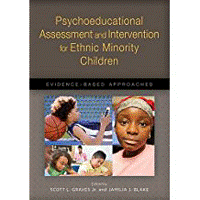“Psychoeducational Assessment and Intervention for Ethnic Minority Children”

“Psychoeducational Assessment and Intervention for Ethnic Minority Children”
Edited by Scott L. Graves, Jr., and Jamilia J. Blake
American Psychological Association
Washington, D.C., 2016
Authors compare standards, offer historical perspective
Reviewed by James K. Luiselli, Ed.D., ABPP, BCBA-D
Public schools within the United States continue to embrace racial and ethnic diversity among the student population. Notably, there are guidelines for multicultural education which continue to expand and evolve with variable success and research supported effectiveness.
This book is one of several publications in the Applying Psychology in the Schools series produced by the American Psychological Association. The purpose of the series is to make visible science, practice, and policy advancements for children and youth in schools and communities.
The book begins with the premise “that ethnic minority students are not homogeneous,” and require “cultural and context-specific research and interventions.” The editors set out to integrate current theory, research, and practice among ethnic minority students by compiling 14 chapters devoted to assessment, educational practices, consultation and academic performance.
There are three organizing sections of the book, starting with an historical overview and presentation of current issues concerning assessment. The chapters in this section trace early patterns of psychological assessment of ethnic minority children and describe a theoretical model to explain achievement outcomes with Black and Latino youth.
In a separate chapter, the focus is applying standards for educational and psychological testing with minority student populations. The authors compare and contrast six versions of standards established by the American Educational Research Association and National Council on Measurement in Education, leading to several conclusions about fairness in testing and test interpretation.
Following the introductory chapters, the book covers contemporary principles and practices for intellectual, academic, social-emotional, behavioral, early childhood and neuropsychological assessment. These chapters are quite instructive, referencing specific assessment instruments and protocols, formal and informal diagnostic procedures and intervention decisions that are derived from assessment results.
In addressing school supports for ethnic minority children, the editors selected several pertinent topics: reading, social-emotional curricula, consultation-mediated intervention services and community-based health promotion. The research reported in these chapters suggests many promising strategies with potential large-scale application.
The book concludes with two chapters that round out the extensive coverage of assessment and intervention. One chapter describes a multicultural training program for psychology undergraduate students and the second chapter details single-subject research methods for increasing academic performance of ethnically diverse learners.
“Psychoeducational Assessment and Intervention for Ethnic Minority Children” will be of considerable value to clinical, school and counseling psychologists. The editors provide a solid integration of practice and research that supports their emphasis on evidence-based approaches.
The book also shines by giving us an historical perspective on the development of testing and intervention methods with students of racial and ethnic diversity. This backdrop reveals many of the problems confronted by diagnosticians, psychometricians, and educators, noteworthy achievements and next steps to motivate future change and progress.
James K. Luiselli, Ed.D., ABPP, BCBA-D is a clinical psychologist in private practice and Adjunct Faculty in the School Psychology Program at William James College.
Learn more about the book: Psychoeducational Assessment and Intervention for Ethnic Minority Children: Evidence-Based Approaches (Applying Psychology in the Schools)
